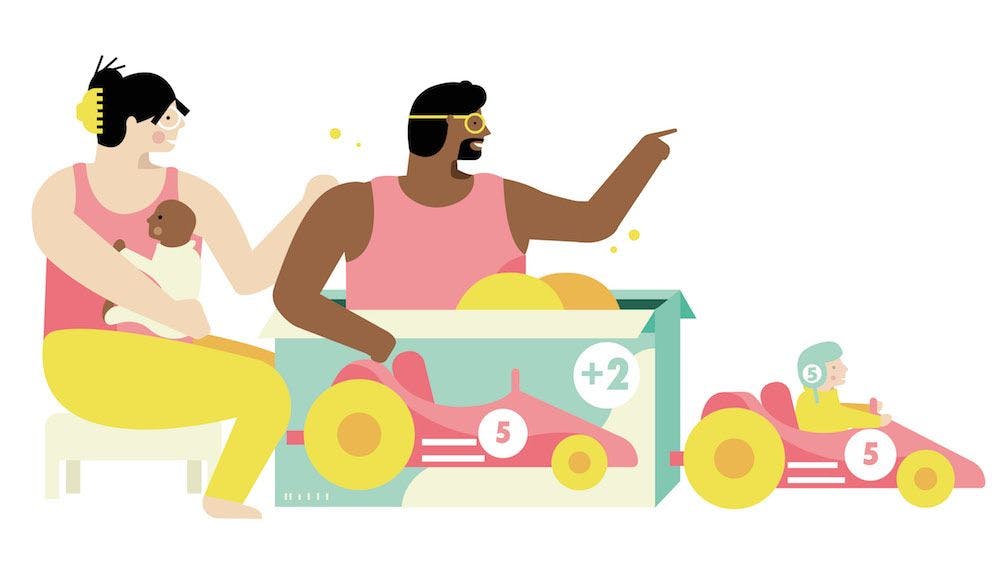
It’s time to take inspiration from children – let your imagination run wild and start taking playtime seriously. It could do your mind and body the world of good!
As the mother of a two-year-old, I spend a lot of time with small children and, while I’ve been busy teaching my daughter all the little life skills that I think she’ll need, she and her friends have been – inadvertently – reminding me how to play, and the value of doing so.
Once the most natural of impulses, many of us lose our playfulness as our heads, and days, get filled with work, responsibilities, and the stresses of adulthood. But, far from being frivolous and childish, making room for a bit of playtime can have a positive impact on your mind and body, no matter what your age.
1. Curiouser and curiouser…
The United Nations Commission for Human Rights has recognised play as the right of every child, and many psychologists agree that it’s vital for personal development and learning. In a famous 1972 study, Rosenzweig, Bennett and Diamond found that rats who had been kept in a stimulating environment, in which they were able to play, had vastly improved neurological growth, when compared to rats who had been kept in a non-stimulating environment. The implication is that, for humans too, remaining interested, excited, and engaged with our surroundings, is crucial for neurological and psychological welfare. Stay curious and your brain will thank you for it!

2. Think like a toddler
There’s nothing quite like the wide-eyed wonder of childhood and, while it’s impossible to recapture our youth, it’s entirely possible to retain some of its openness. As we grow older, we settle into habits, and it can be tempting to avoid new situations or to approach them with caution, mentally running through a series of “worst case scenarios”. Free of these behavioural prejudices, my toddler greets new opportunities with enthusiasm. Rather than wasting energy on worrying, she embraces all the experience has to offer – good or bad! Scientists have proven that trying new things can promote the creation of connections in the brain, and cause a rush of dopamine – the reward chemical. A decline in dopamine has been associated with an ageing brain, as well as several age-related diseases. So, take the plunge, try something different and it can, quite literally, expand your mind!
3. Dream a little dream
As a child, I spent many happy hours, totally immersed in a land of make-believe and, if I’m honest,I’ve never entirely grown out of it. Imaginative play is a valuable tool that enables us to work through challenges and scenarios before we’re actually confronted by them. If you’ve ever indulged in a daydream, or discussed a situation’s ideal outcome with a friend or partner, you’ve really been playing grown-up “let’s pretend”. It doesn’t matter how likely or unlikely the situation in question may be, what counts is that you’re using your brain to calculate and create possibilities, thus strengthening and establishing neural pathways and connections. Children who participate in imaginary play are practising problem-solving, reasoning, self-regulation, and sociability. So all that fantasising out of the window at work may not be quite so fruitless after all!
4. It’s not a competition!
As adults, our play tends to be competitive. This, in itself, isn’t a bad thing, but it’s important to invest in non-competitive play, too. Truly non-competitive play is undertaken solely for its own sake, and there’s something refreshing about performing an activity purely for enjoyment. Savouring a soak in a bath, going for a walk, or whiling away a few hours with a much-loved pet may feel indulgent, but dedicating time to your own amusement not only lifts your mood, it can also lower blood pressure and relieve stress.

5. Practically perfect
“In every job that must be done, there is an element of fun. You find the fun and ‘snap!’ – the job’s a game.” So sang Julie Andrews in the Disney adaptation of Mary Poppins, and it’s true – children find fun in the most unexpected places. And there’s no reason why we can’t continue to do so throughout our lives. Of course, we have to take our responsibilities seriously, and there are certainly some activities that are truly devoid of joy. But next time you’re feeling jaded by routine, or bored by your circumstances, try “finding the fun”. You don’t necessarily need to set aside specific time to play in order to feel the benefits, you can simply adjust the way you approach your everyday tasks.
So, whether you play alone, with a friend, or in a team, allowing yourself to let go and lark about is a valuable skill and, like all skills, it gets easier with practice. Go on, abandon the rulebook, let your hair down and start to take play seriously!

